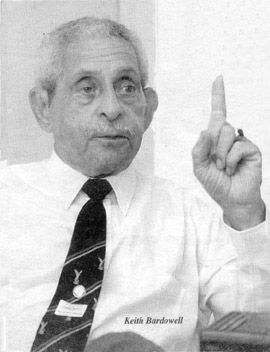|
||||||||||||||||||||||||||||||
| Home > Ex-Service > Article – Memories of War | ||||||||||||||||||||||||||||||
|
Reproduced with the kind
permission of the Jamaica Observer newspaper. Memories of War Wednesday September 15 was observed as Battle of Britain Day by Royal Air Forces Association (RAFA) chapters all over the world. The Day was marked as a commemoration of the Battle of Britain of World War II, in which the Royal Air Force saved Britain by shooting down most of the German planes that were attempting to bring Britain to her knees by bombing London and her major cities. The Jamaican chapter of the RAFA was abuzz with activities in commemoration of the say with a wreath-laying ceremony at the Cenotaph at National Heroes Park in the morning and a reunion dinner at Curphey Place later in the evening. According to Keith Levy, chairman of the local chapter of the RAFA, every year during Battle of the Britain Week, his chapter tries to raise as much funds as possible to assist the charities of the RAFA and thereby help indigent ex-servicemen who served in the war. The Observer caught up with three such ex-servicemen during last Sunday’s Brunch at Curphey Place and asked them about their experiences during the War. Here are their stories: Keith Bardowell For a boy at age 16, it was no easy task for Keith Bardowell to become a serviceman for the Royal Air Force (RAF). Participating in such a mission was all that mattered to him, however, and so his qualification for the RAF came about with some well-planned tactics. "When I was applying, I told them that I was eighteen years and six months old – the correct age for qualification.
"My mother did not even know when I left, because I could not tell her because of my age. I cablegraphed her (that was the type of medium available at that time) from Bermuda to England to tell her that I had joined the Air Force. She was very mad and fortunately my aunts and uncles were able to ‘cool her down’ because she was determined to write to the air ministry to tell them my age so that they would send me home." His mother’s concerns were, of course, well founded, because the environment of World War II was traumatic for someone of Bardowell’s age. "For a boy of sixteen years it was a dreadful experience. "Once you assume the responsibility of a serviceman, having claimed to be a certain age, then you have to act the part whether you like it or not… "And it didn’t take me a long time to find out that I was wearing a pair of shoes that was much bigger than my feet… and when you went off to England, everybody was considered a man capable of fighting." Bardowell did not do actual combat in England. He played the role of fitter of Class 2 aircraft engines – he was called a Fitter 2E. He worked in the airfields, repairing the damage done to incoming aircraft and ensuring that they were ready for their afternoon tasks. Though unwilling to elaborate further on what he had experienced in the actual war, Bardowell disclosed that his most memorable moments were every time he realised that he was actually alive. "There were times when you had to wonder if you would make it home. These things I don’t like to talk about, it is better to keep them in the back of his mind," he said. Bardowell spent a period of two years as a serviceman in World War II, but he did not return to Jamaica until 1947. He explained that there was an orderly discharge of men, in that each had to have a demobilisation number. With this system, one could not leave until his number came up. "In my case, as a West Indian, we were sent out [to the West Indies] in groups. Therefore, in one vessel one would find Jamaicans, Trinidadians, Guyanese, etc." With his advanced knowledge of aircraft mechanics, Bardowell was discharged as a leading aircraft technician. His trade did not, however, land him a job of a similar nature in Jamaica. "When you were a technician like I was in Britain, it was not easy to get a promotion. We had to take exams for reclassification. I did not have any interest in becoming a career soldier or a career airman, and so I did not take the exams." He went to work at Alcan for 17 years as a supervisor and then to Grace Fertiliser Manufacturing as assistant plant manager. Though retired, Bardowell still serves as vice-president of the RAFA’s local chapter.
|
|||||||||||||||||||||||||||||
|
|
||||||||||||||||||||||||||||||

 "I took the chance of telling a lie because I
knew I would not stay in Jamaica for very long. At that time the doctor asked me to
present my birth certificate and I said I would. But I already had my excuse well planned.
In those days, the postal service was slow and if I was asked again for the certificate, I
would tell them that I had sent it and it hadn’t arrived yet." Bardowell’s mother,
was the only parent alive at the time, was not aware of his decision to serve, one that
she would surely have rejected.
"I took the chance of telling a lie because I
knew I would not stay in Jamaica for very long. At that time the doctor asked me to
present my birth certificate and I said I would. But I already had my excuse well planned.
In those days, the postal service was slow and if I was asked again for the certificate, I
would tell them that I had sent it and it hadn’t arrived yet." Bardowell’s mother,
was the only parent alive at the time, was not aware of his decision to serve, one that
she would surely have rejected.